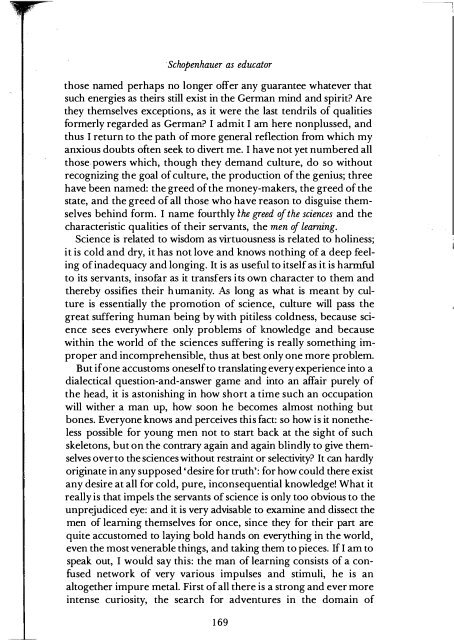Friedrich_Nietzsche - Untimely_Meditations_(Cambridge_Texts_in_the_History_of_Philosophy__1997)
Friedrich_Nietzsche - Untimely_Meditations_(Cambridge_Texts_in_the_History_of_Philosophy__1997)
Friedrich_Nietzsche - Untimely_Meditations_(Cambridge_Texts_in_the_History_of_Philosophy__1997)
You also want an ePaper? Increase the reach of your titles
YUMPU automatically turns print PDFs into web optimized ePapers that Google loves.
Schopenhauer as educatorthose named perhaps no longer <strong>of</strong>fer any guarantee whatever thatsuch energies as <strong>the</strong>irs still exist <strong>in</strong> <strong>the</strong> German m<strong>in</strong>d and spirit? Are<strong>the</strong>y <strong>the</strong>mselves exceptions, as it were <strong>the</strong> last tendrils <strong>of</strong> qualitiesfo rmerly regarded as German? I admit I am here nonplussed, andthus I return to <strong>the</strong> path <strong>of</strong> more general reflection from which myanxious doubts <strong>of</strong>ten seek to divert me. I have not yet numbered allthose powers which, though <strong>the</strong>y demand culture, do so withoutrecogniz<strong>in</strong>g <strong>the</strong> goal <strong>of</strong> culture, <strong>the</strong> production <strong>of</strong> <strong>the</strong> genius; threehave been named: <strong>the</strong> greed <strong>of</strong> <strong>the</strong> money-makers, <strong>the</strong> greed <strong>of</strong> <strong>the</strong>state, and <strong>the</strong> greed <strong>of</strong> all those who have reason to disguise <strong>the</strong>mselvesbeh<strong>in</strong>d form. I name fourthly <strong>the</strong> greed <strong>of</strong> <strong>the</strong> sciences and <strong>the</strong>characteristic qualities <strong>of</strong> <strong>the</strong>ir servants, <strong>the</strong> men <strong>of</strong> learn<strong>in</strong>g.Science is related to wisdom as virtuousness is related to hol<strong>in</strong>ess;it is cold and dry, it has not love and knows noth<strong>in</strong>g <strong>of</strong> a deep feel<strong>in</strong>g<strong>of</strong> <strong>in</strong>adequacy and long<strong>in</strong>g. It is as useful to itself as it is hannfulto its servants, <strong>in</strong>s<strong>of</strong>ar as it transfers its own character to <strong>the</strong>m and<strong>the</strong>reby ossifies <strong>the</strong>ir humanity. As long as what is meant by cultureis essentially <strong>the</strong> promotion <strong>of</strong> science, culture will pass <strong>the</strong>great suffer<strong>in</strong>g human be<strong>in</strong>g by with pitiless coldness, because sciencesees everywhere only problems <strong>of</strong> knowledge and becausewith<strong>in</strong> <strong>the</strong> world <strong>of</strong> <strong>the</strong> sciences suffer<strong>in</strong>g is really someth<strong>in</strong>g improperand <strong>in</strong>comprehensible, thus at best only one more problem.But if one accustoms oneself to translat<strong>in</strong>g every experience <strong>in</strong>to adialectical question-and-answer game and <strong>in</strong>to an affair purely <strong>of</strong><strong>the</strong> head, it is astonish<strong>in</strong>g <strong>in</strong> how short a time such an occupationwill wi<strong>the</strong>r a man up, how soon he becomes almost noth<strong>in</strong>g butbones. Everyone knows and perceives this fact: so how is it none<strong>the</strong>lesspossible for young men not to start back at <strong>the</strong> sight <strong>of</strong> suchskeletons, but on <strong>the</strong> contrary aga<strong>in</strong> and aga<strong>in</strong> bl<strong>in</strong>dly to give <strong>the</strong>mselvesover to <strong>the</strong> sciences without restra<strong>in</strong>t or selectivity? It can hardlyorig<strong>in</strong>ate <strong>in</strong> any supposed 'desire fo r truth': for how could <strong>the</strong>re existany desire at all for cold, pure, <strong>in</strong>consequential knowledge! What itreally is that impels <strong>the</strong> servants <strong>of</strong> science is only too obvious to <strong>the</strong>unprejudiced eye: and it is very advisable to exam<strong>in</strong>e and dissect <strong>the</strong>men <strong>of</strong> learn<strong>in</strong>g <strong>the</strong>mselves for once, s<strong>in</strong>ce <strong>the</strong>y for <strong>the</strong>ir part arequite accustomed to lay<strong>in</strong>g bold hands on everyth<strong>in</strong>g <strong>in</strong> <strong>the</strong> world,even <strong>the</strong> most venerable th<strong>in</strong>gs, and tak<strong>in</strong>g <strong>the</strong>m to pieces. If I am tospeak out, I would say this: <strong>the</strong> man <strong>of</strong> learn<strong>in</strong>g consists <strong>of</strong> a confusednetwork <strong>of</strong> very various impulses and stimuli, he is analtoge<strong>the</strong>r impure metal. First <strong>of</strong> all <strong>the</strong>re is a strong and ever more<strong>in</strong>tense curiosity, <strong>the</strong> search for adventures <strong>in</strong> <strong>the</strong> doma<strong>in</strong> <strong>of</strong>169


